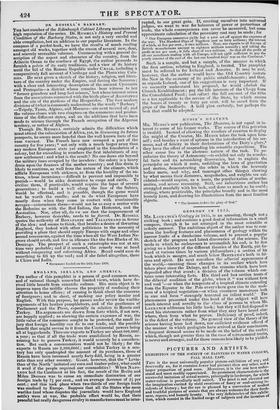ENGLAND, IRELAND, AND AMERICA.
THE author of this pamphlet is a person of good common sense, and of rational though somewhat limited views, which have de- rived little benefit from scientific culture. His main object is to impress upon the middle classes the propriety of confining their attention to home affairs; of ceasing to think about the concerns of foreigners; and in short, of making our policy insular and English. With this purpose, he passes under review the warlike arguments of his brother pamphleteers, and of the gentlemen of Parliament and the Press, especially in relation to Russia and Turkey. His arguments are drawn from facts which, if not new, are happily applied ; as showing the certain expenses of war, the little value of the commerce sought to be protected, the small in- jury that foreign hostility can do to our trade, and the possible benefit that might accrue to it from the Continental powers being all at loggerheads. Thus our exports to Turkey are about 800,000/. a year; so that if all the trade were annihilated by Russia, as- suming her to possess Turkey, it would scarcely be a considera- tion. But such a consummation would not be likely ; for the exports to Russia are 2,300,0001.; and whilst Turkey in a cen- tury has only quadrupled the amount of its purchases, those of Russia have been increased nearly forty-fold, being in a greater ratio than any other country. Grant, however, that the" Levia- than of the North 'S imitated our corn and timber policy, what could it avail if the people required our commodities? When NAPO- LEON had the Continent at his feet, the result of the Berlin and Milan Decrees was to cause an immediate diminution of our foreign trade by 71 per cent., and an average decrease of 21 per cent.; and this took place when two-thirds of our foreign trade was confined to Europe. Suppose that all the States who seem warlike (and whose disputes the journalists would have England settle) were at war, the probable effect would be, that their peaceful but really dangerous rivalry in manufactures must be inter-
rupted, to our great gain. If, erecting ourselves into universal judges, we went to war for balances of power or protections of trade, the whole consequences can never be measured, but some approximate calculation of the pecuniary cost may be made ; for
" Our European commerce yields but a poor set-off against the expenses of the war. The Hundred Days of Narrileon cost us forty millions; the interest of which, at five per cent., is two millions. Now, our exports to all Etoope of British manufactures amount to eighteen millions annually ; and taking the profit at ten per cent., it :falls short of two millions. So that all the profit of all our merchants trading with all Europe, will not yield sufficient to pay the yearly interest of the cost of the last one hundred days' war on the Continent."
Such is a sample, and but a sample, of the manner in which the first section, relating to England, is treated. The pamphlet must be referred to for Ireland and America. It may be said, however, that the author would have the Old Country imitate the New in the economy of its public establishments ; and that, as regards Ireland, one of his suggestions is very important. If' we correctly understand his proposal, he would abolish the Church Establishment ; pay the life interests of the Clergy from the Consolidated Fund; and collect the full amount of the tithe as a tax applicable to the service of the State, by which means the bonus of twenty or forty per cent. will be saved from the gripe of the landlords. A bold plan certainly, but perhaps the best that could be adopted.






















 Previous page
Previous page